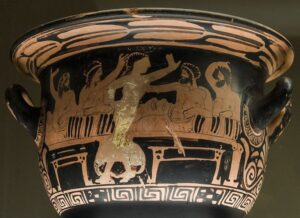Sacred prostitution
Contrary to what it may seem, prostitution was a sacred and distinguished institution in most ancient cultures and even today it is still latent in some areas of Nepal, India and in certain tribes or clans in West Africa and Algeria.
It may seem surprising that in ancient times religion was linked to prostitution, and the Bible still considers it an impure act. In Ancient Greece, however, this union is reflected in the cult of Aphrodite, the goddess of love, sensuality and pleasure. We can therefore understand that the courtesans were the most devoted to this goddess and that they found their powers in her.
Courtesans were considered the freest women in Greece and were among the cultural and social elite.
At that time there was a lot of social distinction between men and women. The curious thing is that in the case of courtesans everything was different; they were considered the freest women in Greece, they had economic independence and were situated in the cultural and social elite.
Hetairas, eternal courtesans
The priestesses of Aphrodite, also known as Hatarias or Heteras, were the only women who had access to training. Unlike other women, the Hetairas received lessons in reading, writing, music and dance in the temples of the goddess. They also acquired some lessons on medicine since one of their tasks was to heal men of their physical and emotional pain.
In this way they became educated women, who participated in philosophy and political gatherings. They were the muses of painters and sculptors, they were known as propagators and inspirers of beauty. They were the ones who satisfied the sexual and intellectual drives of men.
The favorite feasts of the Greeks were celebrated to satiate the appetites of the mind and senses. Courtesans played an essential role in these symposium and banquet scenes. The Hetairas surprised the men with their artistic enjoyment, singing, dancing, playing an instrument or juggling. Philosophy, art and politics were also discussed at these parties. Today, we can see these scenes reflected in the different Greek ceramics.

In Ancient Greece, marriages were arranged for various interests, which is why many love affairs took place outside of marriage. And just like today, many men confessed to having fallen in love with these women masters of the amatory arts.
Socrates himself confesses in the Banquet Dialogue that everything he knows about the nature of love was taught to him by a companion of Aphrodite….
[ Sacred prostitution is also known as religious prostitution, ritual prostitution, or Templar prostitution.]
